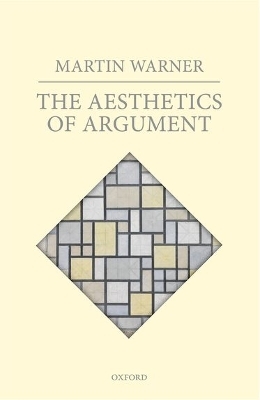
The Aesthetics of Argument
Oxford University Press (Verlag)
978-0-19-873711-7 (ISBN)
Argument and imagination are often interdependent. The Aesthetics of Argument is concerned with how this relationship may bear on argument's concern with truth, not just persuasion, and with the enhancement of understanding such interdependence may bring. The rationality of argument, conceived as the advancement of reasons for or against a claim, is not simply a matter of deductive validity. Whether arguments are relevant, have force, or look foolish--or whether an example is telling or merely illustrative--cannot always be assessed in these terms. Martin Warner presents a series of case studies which explore how analogy, metaphor, narrative, image, and symbol can be used in different ways to frame one domain in terms of another, severally or in various combinations, and how criteria drawn from the study of imaginative literature may have a bearing on their truth-aptness. Such framing can be particularly effective in argumentative roles which invite self-interrogation, as Plato saw long ago. Narrative in such cases may be fictional, whether parabolic or dramatic, autobiographical or biographical, and in certain cases may seek to show how standard conceptualizations are inadequate. Beyond this, whether in poetry or prose and not only with respect to narrative, the "logic" of imagery enables us to make principled sense of our capacity to grasp imagistically elements of our experience through words whose use at the imaginative level has transformed their standard conceptual relationships, and hence judge the credibility of associated arguments. Assessment of the argumentative imagination requires criteria drawn not only from dialectic and rhetoric, but also from poetics.
Martin Warner studied for his BPhil under the supervision of Gilbert Ryle, and taught philosophy for many years at the University of Warwick, where he is now Associate Fellow of its Centre for Research in Philosophy, Literature, and the Arts, which he helped to found. He jointly edits the Ashgate book series 'Transcending Boundaries in Philosophy and Theology', and is a member of the Council of the Royal Institute of Philosophy. His research interests lie in the assessment of rational persuasion, in the relationships of philosophy with both literature and theology, and in the transformative and persuasive powers of language.
Preface ; I. From Analogy to Narrative ; II. From Self-involvement to Judgement: the Potentialities of Plato's Phaedrus ; III. Dialectical Drama: the Dynamics of Plato's Symposium ; IV. Philosophical Autobiography: St. Augustine and John Stuart Mill ; V. The Fourth Gospel's Art of Rational Persuasion ; VI. Philosophical Poetry: the Case of Four Quartets ; VII. The 'Logic' of Imagery I-The Poetic Image ; VIII. The 'Logic' of Imagery II-Logic, Argument, and Imagery ; Afterword ; Bibliography ; Index
| Erscheint lt. Verlag | 15.2.2016 |
|---|---|
| Verlagsort | Oxford |
| Sprache | englisch |
| Maße | 158 x 241 mm |
| Gewicht | 632 g |
| Themenwelt | Geisteswissenschaften ► Philosophie ► Erkenntnistheorie / Wissenschaftstheorie |
| Geisteswissenschaften ► Philosophie ► Sprachphilosophie | |
| Geisteswissenschaften ► Sprach- / Literaturwissenschaft ► Anglistik / Amerikanistik | |
| Geisteswissenschaften ► Sprach- / Literaturwissenschaft ► Literaturwissenschaft | |
| Geisteswissenschaften ► Sprach- / Literaturwissenschaft ► Sprachwissenschaft | |
| ISBN-10 | 0-19-873711-4 / 0198737114 |
| ISBN-13 | 978-0-19-873711-7 / 9780198737117 |
| Zustand | Neuware |
| Haben Sie eine Frage zum Produkt? |
aus dem Bereich

![Was heißt Denken?. Vorlesung Wintersemester 1951/52. [Was bedeutet das alles?] - Martin Heidegger](/media/113619842)
